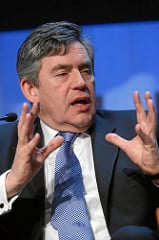 This sure takes some front. As G20 leaders convened with Gordon Brown in London to brainstorm ways out of a chronic global recession, the GSM Association handed them a letter. The mobile business can help the world out of its economic malaise, the letter said – but only if it regulatory conditions are eased.
This sure takes some front. As G20 leaders convened with Gordon Brown in London to brainstorm ways out of a chronic global recession, the GSM Association handed them a letter. The mobile business can help the world out of its economic malaise, the letter said – but only if it regulatory conditions are eased.
The 25 telcos represented by GSMA say they could increase worldwide GDP by three or four percent by 2014 by spending $550 billion on mobile broadband networks – but, as a condition, governments must keep their hands off. Letter excerpt (via Reuters): “In recent times we have experienced a trend of increasing regulatory intervention, often where this is not appropriate.”
One of the GSMA’s key pleas is to be given spectrum freed up as national regulators switch off analogue TV signals. But some carriers are also fighting for spectrum they already own. Though the UK government in February told O2 and Vodafone (NYSE: VOD) they must give up portions of their 900 MHz band to rivals in an auction, FT.com says there has been little common ground reached amongst UK players on how the band might be traded, so a government edict is looming. The irony: both the government and the telcos say they want to guarantee citizens basic-speed mobile broadband.
But the GSMA’s other cries – for example, that European Commission mobile data price caps discourage investment – will go down like a lead balloon with pro-consumer entities like the EC. Under new EC rules, mobile data roaming prices are due to fall by 75 percent by 2011 – surely a stimulus to consumer adoption – but GSMA chief government affairs officer Tom Phillips found it in himself to tell Reuters: “It’s just about being expedient, short-term, politically popular. It’s no way to run such a strategically important industry.”
(Photo: World Economic Forum, some rights reserved)